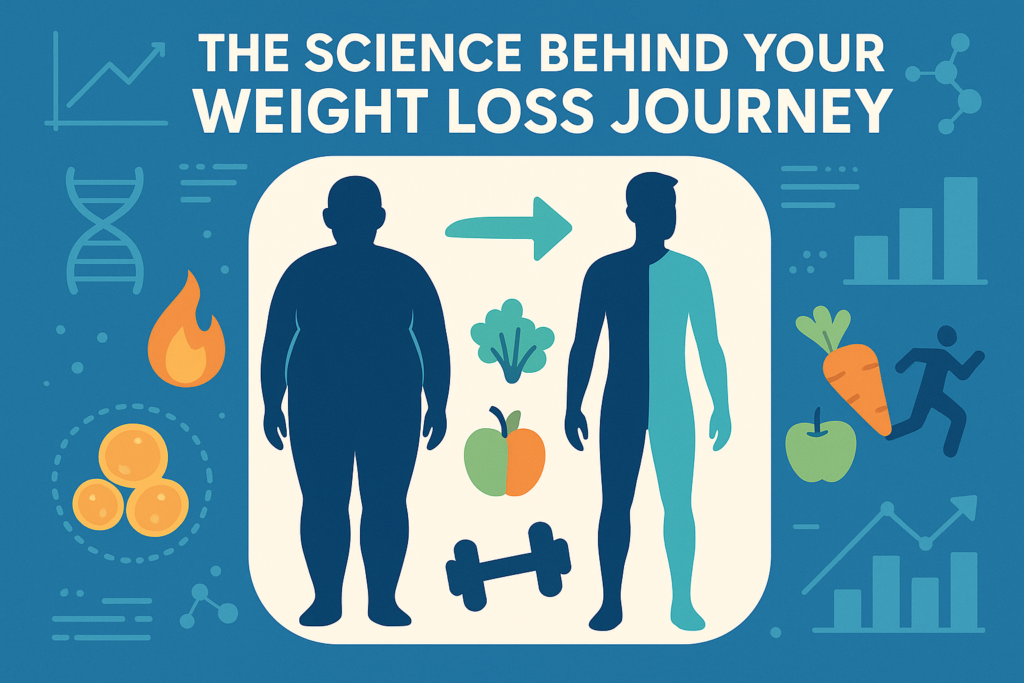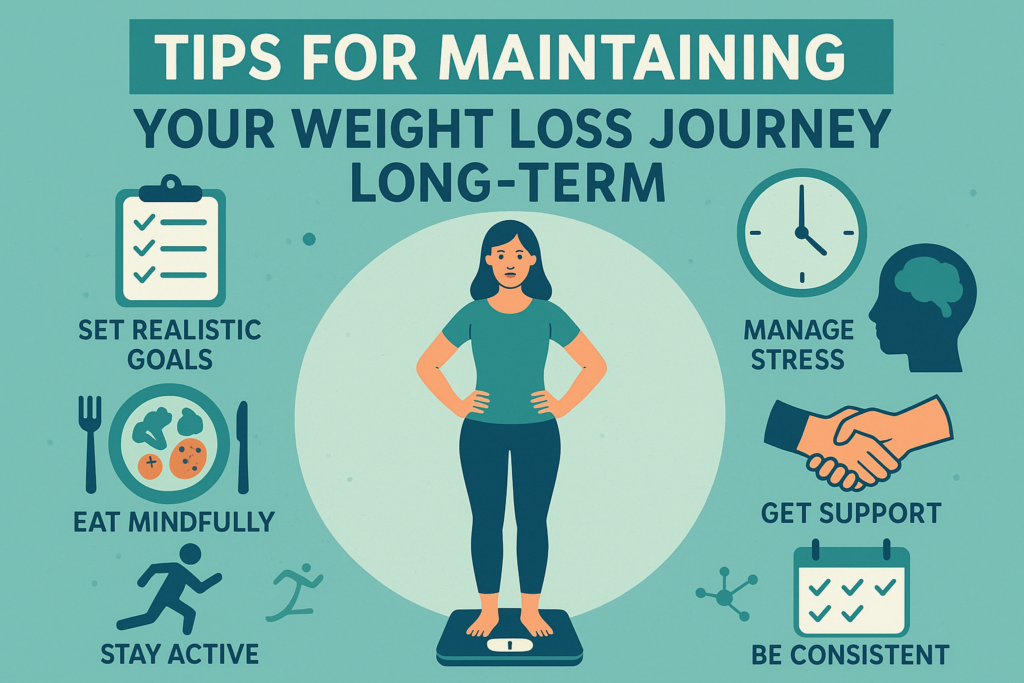Embarking on a weight loss journey can often feel like an uphill battle. Whether you’re aiming to shed a few extra pounds or undergo a complete lifestyle transformation, the process requires the right knowledge, motivation, and strategies. Many people start with enthusiasm but falter because they lack a clear plan or sustainable habits. This guide is designed to help you navigate every step of your weight loss journey with expert-backed advice, practical tips, and the latest scientific research, including insights from the World Health Organization (WHO) and Harvard Medical School.
Why Starting a Weight Loss Journey Matters
Health Risks of Excess Weight
Carrying excess weight isn’t just about how you look — it can have serious health consequences. The WHO reports that obesity and overweight are major risk factors for non-communicable diseases such as heart disease, type 2 diabetes, certain cancers, and musculoskeletal disorders. These conditions contribute significantly to premature death and reduced quality of life worldwide.
When you commit to a weight loss journey, you’re investing in your health and future. Losing even a modest amount of weight (5-10% of your body weight) can significantly reduce your risk of chronic diseases, lower blood pressure, improve cholesterol levels, and enhance insulin sensitivity.
Mental and Emotional Benefits
Weight loss also positively affects mental health. Many individuals report improved self-esteem, reduced anxiety, and better mood after losing weight. Physical activity, a core part of weight loss, releases endorphins — natural mood boosters that help combat stress and depression.

The Science Behind Your Weight Loss Journey
Calories In Versus Calories Out
At its core, weight loss happens when you burn more calories than you consume. This calorie deficit forces your body to use stored fat for energy. However, simply eating less doesn’t always guarantee weight loss due to factors like metabolic rate, hormone balance, and muscle mass.
- Basal Metabolic Rate (BMR): This is the number of calories your body needs to maintain basic functions at rest — breathing, circulation, and cell production.
- Thermic Effect of Food: Your body uses energy to digest, absorb, and process nutrients.
- Physical Activity: Exercise and everyday movements burn additional calories.
Harvard Medical School emphasizes that increasing lean muscle mass through resistance training can raise your BMR, helping you burn more calories even at rest.
Hormones and Weight Loss
Hormones such as insulin, leptin, ghrelin, and cortisol play key roles in hunger regulation, fat storage, and metabolism. For example, chronic stress can elevate cortisol levels, promoting fat accumulation around the abdomen. Understanding these hormonal influences can help tailor your weight loss strategies.
The Role of Genetics
Genetics affect how your body stores fat, your appetite, and your metabolic rate. While you can’t change your genes, you can modify lifestyle factors to maximize your body’s potential and improve outcomes on your weight loss journey.
Setting Yourself Up for Success: Practical Tips to Start Your Weight Loss Journey
Define Clear and Achievable Goals
Setting goals is a critical first step. Use the SMART framework:
- Specific: Clearly define what you want to achieve (e.g., lose 10 pounds).
- Measurable: Track progress with tools like scales, body measurements, or fitness trackers.
- Achievable: Be realistic about what you can accomplish in a timeframe.
- Relevant: Align goals with your values and lifestyle.
- Time-bound: Set deadlines to keep motivation high.
Write your goals down and revisit them regularly to stay on track.
Create a Personalized Plan
One size does not fit all in weight loss. Your age, sex, medical history, and lifestyle should shape your plan. Consulting a registered dietitian or healthcare professional can help develop a tailored approach.
Track Your Progress Consistently
Use food diaries, apps like MyFitnessPal, or wearable devices to monitor food intake, exercise, and sleep. Tracking not only holds you accountable but also provides insight into what’s working and where adjustments are needed.
Nutrition: The Foundation of Your Weight Loss Journey
Emphasize Whole, Nutrient-Dense Foods
Whole foods provide essential nutrients and fiber that keep you satiated. Fill your plate with:
- Vegetables and fruits of all colors for antioxidants and vitamins.
- Lean protein sources like chicken, fish, legumes, and tofu to preserve muscle.
- Whole grains such as brown rice, quinoa, and oats for steady energy.
- Healthy fats from nuts, seeds, avocado, and olive oil to support hormone function.
Avoid Empty Calories and Processed Foods
Sugary beverages, fast food, baked goods, and refined grains are calorie-dense but nutrient-poor. They cause blood sugar spikes and crashes, increasing hunger and cravings.
Practice Portion Control
Even healthy foods can contribute to weight gain if eaten in large amounts. Learning portion sizes and mindful eating techniques can prevent overeating.
Hydration Matters
Drinking enough water supports metabolism and helps control appetite. Sometimes thirst is mistaken for hunger, so staying hydrated can prevent unnecessary snacking.
Exercise: Moving Your Weight Loss Journey Forward
Combine Cardio and Strength Training
Cardiovascular exercise (walking, running, cycling) burns calories and improves heart health. Strength training builds muscle, which boosts resting metabolic rate.
Start Slow and Progress Gradually
If you’re new to exercise, begin with 10-15 minutes a day and gradually increase intensity and duration. Consistency over intensity wins the weight loss journey.
Incorporate Everyday Movement
Beyond formal workouts, increase daily activity: take stairs, park farther, stand while working, or do short stretching breaks. These small changes add up.
Mindset and Behavioral Strategies
Practice Mindful Eating
Focus fully on your meals, savor flavors, and listen to hunger and fullness cues. Avoid distractions such as phones or TV.
Manage Stress Effectively
Stress can lead to emotional eating and disrupt hormones that regulate weight. Techniques like deep breathing, meditation, yoga, or hobbies can reduce stress levels.
Prioritize Sleep
Poor sleep is linked to weight gain due to altered hunger hormones and increased cravings. Aim for 7-9 hours per night and maintain a regular sleep schedule.
Case Study: Jane’s Successful Weight Loss Journey
Jane, a 35-year-old office worker, struggled with weight gain for years due to sedentary habits and emotional eating. After setting a realistic goal to lose 20 pounds in 6 months, she took the following steps:
- Switched to a balanced diet rich in vegetables, lean protein, and whole grains.
- Incorporated daily 30-minute walks and started strength training twice a week.
- Used a food diary app to track calories and emotional triggers.
- Improved sleep hygiene and practiced meditation to manage stress.
Result: Jane lost 22 pounds in 6 months, improved her energy, and lowered her blood pressure, confirmed by her doctor’s follow-up. This case highlights that sustainable changes over time lead to lasting results.
Insights from WHO and Harvard Medical School
WHO’s Comprehensive Approach to Weight Management
The WHO stresses that individual weight loss must be supported by:
- Healthy food environments that make nutritious choices accessible.
- Policies encouraging physical activity in schools, workplaces, and communities.
- Public health campaigns to educate and motivate populations.
- Addressing social determinants like poverty and education that influence obesity risk.
Harvard’s Emphasis on Sustainable Lifestyle Change
Harvard Medical School research points out that quick fixes rarely last. Instead, focus on:
- Behavioral changes that fit your preferences and lifestyle.
- Combining dietary changes with regular physical activity.
- Adapting plans to your body’s response and challenges.
- Seeking support when needed, including professionals and social networks.
Common Challenges and How to Overcome Them
Weight Loss Plateaus
Plateaus are natural as your metabolism adjusts. Solutions include changing your workout routine, adjusting calorie intake, or focusing on non-scale victories like increased strength or endurance.
Emotional Eating and Cravings
Recognize emotional triggers and develop healthier coping mechanisms such as journaling, talking with a friend, or engaging in hobbies.
Motivation and Accountability
Keep motivation high by:
- Finding a workout buddy or joining a support group.
- Celebrating milestones with non-food rewards.
- Reminding yourself of your reasons for starting.

Tips for Maintaining Your Weight Loss Journey Long-Term
View Weight Loss as a Lifestyle Change
Instead of temporary dieting, adopt habits you can maintain indefinitely, such as balanced eating and regular activity.
Keep Goals Dynamic
As you progress, revise your goals to keep them challenging yet attainable.
Regular Health Check-Ups
Track your health markers like blood pressure, cholesterol, and blood sugar to monitor improvements beyond the scale.
Seek Professional Guidance
Dietitians, trainers, therapists, or medical professionals can help navigate challenges, create personalized plans, and maintain motivation.
Frequently Asked Questions
How quickly can I expect results on my weight loss journey?
Safe, sustainable weight loss is around 1-2 pounds per week. Rapid loss can cause muscle loss, nutrient deficiencies, and is often followed by rebound weight gain.
Can I lose weight without exercising?
Yes, diet has a greater impact on weight loss, but combining it with exercise improves muscle tone, metabolism, and overall health.
What if I have medical conditions?
Consult a healthcare professional before beginning any weight loss program to tailor recommendations safely.
How do I stay motivated over time?
Track progress, celebrate small wins, find social support, and remind yourself regularly why you started.
Conclusion
Starting your weight loss journey is a vital step toward a healthier, happier life. By setting clear goals, embracing balanced nutrition, integrating enjoyable physical activity, and nurturing a positive mindset, you create the foundation for lasting change. Remember, it’s a marathon, not a sprint. Use insights from WHO and Harvard to guide your path, be patient with yourself, and celebrate every victory.
Your weight loss journey begins today take that first step toward a better you!





